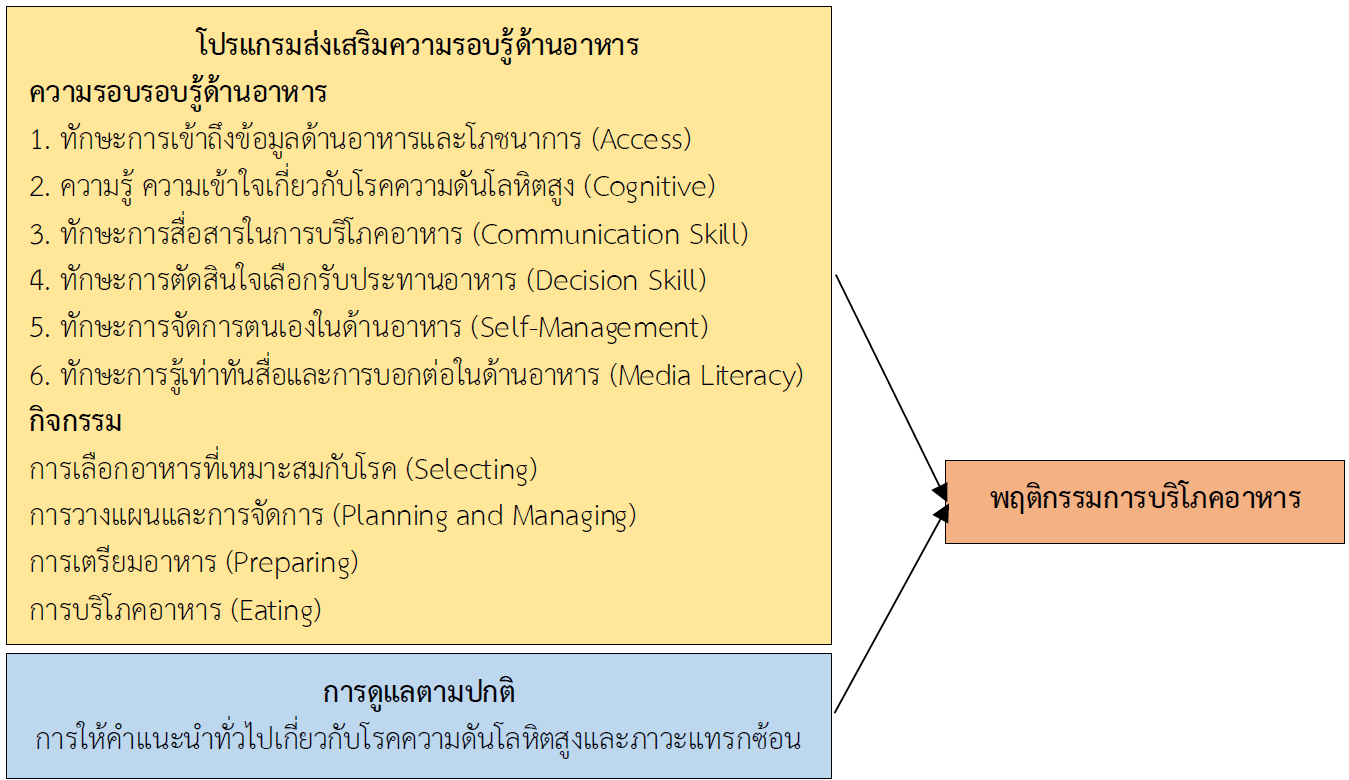ผลของโปรแกรมการส่งเสริมความรอบรู้ด้านอาหารต่อพฤติกรรมการบริโภคอาหารในผู้ใหญ่ที่เป็นโรคความดันโลหิตสูงที่ควบคุมไม่ได้ในชุมชน
คำสำคัญ:
โปรแกรมการส่งเสริมความรอบรู้, ความรอบรู้ด้านอาหาร, พฤติกรรมการบริโภคอาหาร, โรคความดันโลหิตสูงที่ควบคุมไม่ได้บทคัดย่อ
การวิจัยแบบกึ่งทดลองแบบ 2 กลุ่ม วัดก่อน-หลังการทดลองครั้งนี้ มีวัตถุประสงค์เพื่อเปรียบเทียบคะแนนพฤติกรรมการบริโภคอาหารของผู้ใหญ่ที่เป็นโรคความดันโลหิตสูงที่ควบคุมไม่ได้ในชุมชนระหว่างกลุ่มที่ได้รับโปรแกรมส่งเสริมความรอบรู้ด้านอาหารและกลุ่มที่ได้รับการพยาบาลตามปกติ กลุ่มตัวอย่างในการศึกษาครั้งนี้คือ ผู้ที่เป็นโรคความดันโลหิตสูงวัยผู้ใหญ่ที่ควบคุมความดันโลหิตไม่ได้ จำนวน 40 คน แบ่งเป็นกลุ่มเปรียบเทียบ และกลุ่มศึกษา กลุ่มละ 20 คน เครื่องมือในการวิจัยประกอบด้วย 2 ส่วนคือ ส่วนที่ 1 เครื่องมือดำเนินการศึกษาคือโปรแกรมการส่งเสริมความรอบรู้ด้านอาหารในผู้ใหญ่ที่เป็นโรคความดันโลหิตสูง ส่วนที่ 2 เครื่องมือรวบรวมข้อมูล คือ แบบบสอบถามข้อมูลทั่วไป แบบสอบถามความรอบรู้ด้านอาหาร และแบบสอบถามพฤติกรรมการบริโภคอาหาร ซึ่งได้แบบรวบรวมข้อมูลได้ผ่านการตรวจสอบความตรงของเนื้อหาจากผู้ทรงคุณวุฒิจำนวน 6 ท่าน ได้ค่าความตรงเชิงเนื้อหาเท่ากับ 1.0 และได้ค่าความเชื่อมั่นเท่ากับ .80 และ .87 ตามลำดับ วิเคราะห์ข้อมูลด้วยสถิติเชิงพรรณนา สถิติ Paired t–test และ independent t–test ผลการวิจัยพบว่า
1. ภายหลังได้รับโปรแกรมการส่งเสริมความรอบรู้ด้านอาหารกลุ่มเปรียบเทียบมีคะแนนความรอบรู้ด้านอาหารสูงกว่าก่อนการเข้าร่วมโปรแกรมฯ อย่างมีนัยสำคัญทางสถิติที่ระดับ .001 (p-value < .001)
2. คะแนนพฤติกรรมการบริโภคอาหารภายหลังได้รับโปรแกรมของกลุ่มเปรียบเทียบสูงกว่ากลุ่มศึกษา อย่างมีนัยสำคัญทางสถิติที่ระดับ .05 (p-value = .029)
ผลการวิจัยนี้สามารถใช้เป็นแนวทางให้พยาบาลเวชปฏิบัติชุมชนและทีมสุขภาพนำโปรแกรมการส่งเสริมความรอบรู้ด้านอาหารไปใช้ในการส่งเสริมพฤติกรรมการบริโภคอาหารของผู้ใหญ่ที่เป็นโรคความดันโลหิตสูงที่ควบคุมไม่ได้ในชุมชนพื้นที่อื่น ๆ ได้
เอกสารอ้างอิง
Arnthong, M., & Hunnirun, P. (2022). Development of health literacy model on laboratory results and self-care behaviors among elderly with chronic diseases in the 9th regional health. Journal of Buddhist Anthropology. 7(4), 474-492.
Burns, N., & Groove, S. K. (2009). The Practice of Nursing Research: Appraisal, Synthesis, and Generation of Evidence. St. Louis: Saunders Elsevier.
Doungpibol, P. (2016). The development of self-management skills on eating behaviors for delayed chronic kidney disease in CKD clinic Watphleng hospital. Journal of Research for Health Improvement and Quality of Life, 2(3), 13-24. (in Thai)
Department of Disease Control, Ministry of Public Health. (2017). 20-year National Strategic Plan for Prevention and Control of Disease and Health Hazards (2017-2036). Bangkok: Graphic and Design Publishing House.
Department of Disease Control. (2021). Manual for the Process of Creating Health Knowledge in Preventing and Controlling Disease and Health Hazards. Retrieved January 31, 2023 from https://ddc.moph.go.th. (in Thai)
Division of Noncommunicable Diseases, Department of Disease Control, Ministry of Public Health. (2022). Details of Indicators for Monitoring and Monitoring the Quality of Non-Communicable Disease Operations Services. (Diabetes and High Blood Pressure) for Fiscal Year 2022. Retrieved January 31, 2023 from https://ddc.moph.go.th. (in Thai)
Jard-ngoen, G., & Poonnotok, W. (2023). Effective of health behavior modification program in virtual clinic. Journal of Health and Environmental Education, 8(1), 73-86. (in Thai)
Jobsri, C. (2022). Oral Health Literacy Influencing Oral Health Behavior Among Parents of Pre-School Children in Muang District, Nakhon Sawan province. Doctoral Dissertation, Naresuan University.
Inthakamhaeng, A. (2017). Health Literacy: Measurement and Development. Bangkok: Sukhumvit Publishing.
Makpha, S., & Ouphakhom, W. (2023). The development of rational drug use literacy promoting of chronic patients in Phichit province. Regional Health Promotion Center 9 Journal, 17(1), 339-353. (in Thai)
Muangpae, P. (2022). Predictive Factors of Salt and Sodium Consumption Behavior Among People with Risk of Hypertension in Nong Phai District, Phetchabun. [Master's Thesis], Naresuan University. (in Thai)
Nangyaem, A., Deenan, A., & Chunlestskul, K. (2007). Factors predicting disease-specific eating behavior of patients with high blood pressure. Journal of Nursing Science Chulalongkorn University, 19(3), 84-96. (in Thai)
Nunyapruk, C., Therawiwat, M., Kaeodumkoeng, K., & Imamee, N. (2019). Factors related to blood pressure control behaviors among hypertensive patients in Ranod hospital, Songkhla province. Journal of Health Education, 42(1), 190-203. (in Thai)
Nutbeam, D. (2008). Health literacy as a public health goal: A challenge for contemporary health education and communication strategies into the 21st century. Health Promotion International, 15(3), 259-267.
Panchathongkarm, S. (2023). Health literacy prevents diabetes and hypertension. working age in health promotion establishments, health region 4. Journal of Health and Environmental Education, 8(2), 1-8. (in Thai)
Sumrouyg, S. (2023). Nursing care of diabetic patients who cannot control their blood sugar in the chronic disease at clinical Phrayuen hospital: Comparative with two case studies. Journal of Health and Environmental Education, 8(1), 61-72. (in Thai)
Sujamnong, S., Therawiwat, M. & Imamee, N. (2013). Factors related to self-management of hypertensive patients, Taladkwan district health promoting hospital, Nonthaburi province. Journal of Boromarajonani College of Nursing, 29(2), 20-30. (in Thai)
Sirithai, N, & Piripun, C. (2022). Self-care of diabetic patients and health literacy: case study of diabetic patients of Ban Nong Kang khen sub-district health promoting hospital, Nonthaburi province, Thailand. Journal of Health Science, 31(2), 289-298. (in Thai)
Strategy and Planning Division, Ministry of Public Health. (2012). Study Report Thailand Death Data Quality. Retrieved January 31, 2023 from https://spd.moph.go.th. (in Thai)

ดาวน์โหลด
เผยแพร่แล้ว
ฉบับ
ประเภทบทความ
สัญญาอนุญาต
ลิขสิทธิ์ (c) 2024 วารสารเครือข่ายวิทยาลัยพยาบาลและการสาธารณสุขภาคใต้

อนุญาตภายใต้เงื่อนไข Creative Commons Attribution-NonCommercial-NoDerivatives 4.0 International License.
1. บทความหรือข้อคิดเห็นใด ๆ ที่ปรากฏในวารสารเครือข่าย วิทยาลัยพยาบาลและการสาธารณสุขภาคใต้ ที่เป็นวรรณกรรมของผู้เขียน บรรณาธิการหรือเครือข่ายวิทยาลัยพยาบาลและวิทยาลัยการสาธารณสุขภาคใต้ ไม่จำเป็นต้องเห็นด้วย
2. บทความที่ได้รับการตีพิมพ์ถือเป็นลิขสิทธิ์ของ วารสารเครือข่ายวิทยาลัยพยาบาลและการสาธารณสุขภาคใต้







